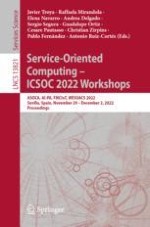2023 | OriginalPaper | Buchkapitel
Simulating IoT Systems from High-Level Abstraction Models for Quality of Service Assessment
verfasst von : José A. Barriga
Erschienen in: Service-Oriented Computing – ICSOC 2022 Workshops
Verlag: Springer Nature Switzerland
Aktivieren Sie unsere intelligente Suche, um passende Fachinhalte oder Patente zu finden.
Wählen Sie Textabschnitte aus um mit Künstlicher Intelligenz passenden Patente zu finden. powered by
Markieren Sie Textabschnitte, um KI-gestützt weitere passende Inhalte zu finden. powered by
